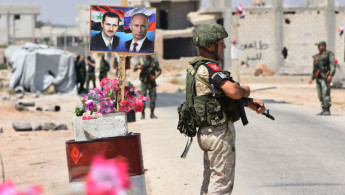Damascus slams US-Turkish patrols in Syria as 'act of aggression'
The Syrian government also reiterated its "absolute rejection" of a planned safe zone in the area, calling it a violation of Syria's territorial unity.
"The Syrian Arab Republic condemns in the strongest terms the joint patrols conducted by the United States and the Turkish regime," said state news agency SANA, citing a foreign ministry source on Sunday.
The source described the patrols as an "aggression" that "aims to complicate and prolong the crisis in Syria," SANA added.
The comments came after the United States and Turkey on Sunday began joint patrols in northeastern Syria aimed at easing tensions between Ankara and US-backed Kurdish forces.
Six Turkish armoured vehicles crossed the border to join US troops in Syria for their first joint patrol under a deal reached between Washington and Ankara, an AFP journalist reported.
Two helicopters overflew the area as the Turkish vehicles drove through an opening in the concrete wall erected between the two countries.
The agreement reached on August 7 aims to establish a "safe zone" between the Turkish border and the Syrian areas east of the Euphrates river controlled by the Kurdish People's Protection Units militia.
The YPG is an ally of the US but seen as a terrorist organisation by Turkey.
Turkish President Recep Tayyip Erdogan has threatened to launch an operation against the YPG in Syria unless progress is made on setting up the safe zone.
"We do not have too much time or patience regarding the safe zone. Within a few weeks if our soldiers do not start to actually control this area, there will be no other option left but to implement our own operation plans," Erdogan said during a speech in Istanbul.
Erdogan said his US counterpart Donald Trump had promised it would be 32 kilometres (20 miles) wide.
A joint centre of operations was recently established as part of the agreement.
Since last year, Erdogan has repeatedly threatened to launch an assault east of the Euphrates river against the YPG, which fought against the Islamic State (IS) group.
Turkey previously conducted cross-border operations in northern Syria supporting Syrian rebels in 2016 against IS and in early 2018 against the YPG.
Ankara says the YPG militia is a "terrorist" offshoot of the outlawed Kurdistan Workers' Party.
The PKK, which has waged an insurgency against the Turkish state since 1984, is blacklisted as a terrorist group by Ankara, the US and the European Union.
Border protests
Meanwhile, hundreds of Syrians held anti-regime protests on Friday in rebel-held Idlib province where a fragile ceasefire has paused a deadly months-old offensive.
Some demonstrators gathered near the Bab al-Hawa border crossing with Turkey, where Turkish border guards last week fired warning shots and tear gas to disperse Syrian protesters.
They waved the three-star flag of the eight-year-old uprising and chanted against President Bashar al-Assad's regime, while some called on rebel backer Turkey to open its borders.
"We only want the Turkish government to open its borders for our brothers who live under the olive trees," protester Abu Haytham told AFP, referring to displaced Syrians living in the open air.
The demonstrations came after Damascus's ally Russia announced a ceasefire for the northwestern Idlib region last Friday.
Airstrikes have stopped since the agreement went into effect last Saturday morning, but sporadic artillery fire has continued.
Russia-backed regime forces have been pressing an offensive against Idlib since the end of April.
More than 960 civilians have been killed in four months of heavy bombardment, according to the Britain-based Syrian Observatory for Human Rights.
The United Nations says more than 400,000 people have been displaced.
Syria's conflict has killed more than 370,000 people and driven millions from their homes since it started with the brutal repression of anti-government protests in 2011.
Follow us on Twitter: @The_NewArab





 Follow the Middle East's top stories in English at The New Arab on Google News
Follow the Middle East's top stories in English at The New Arab on Google News
![The UAE is widely suspected of arming the RSF militia [Getty]](/sites/default/files/styles/image_330x185/public/2024-11/GettyImages-472529908.jpg?h=69f2b9d0&itok=Yauw3YTG)
![Netanyahu furiously denounced the ICC [Getty]](/sites/default/files/styles/image_330x185/public/2024-11/GettyImages-2169352575.jpg?h=199d8c1f&itok=-vRiruf5)
![Both Hamas and the Palestinian Authority welcomed the ICC arrest warrants [Getty]](/sites/default/files/styles/image_330x185/public/2024-11/GettyImages-2178351173.jpg?h=199d8c1f&itok=TV858iVg)